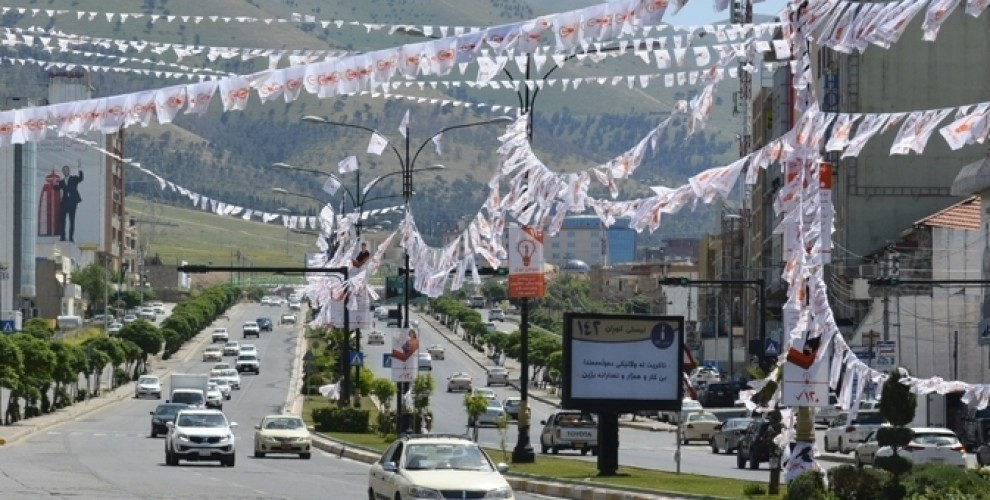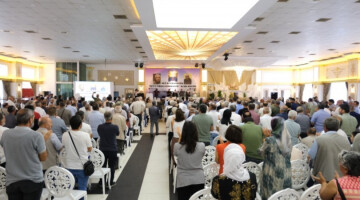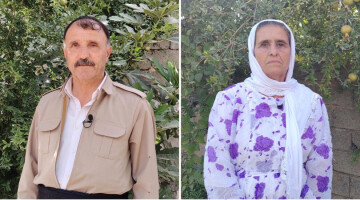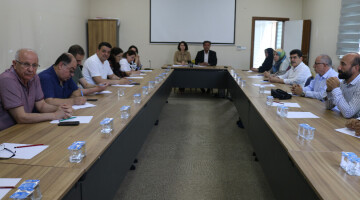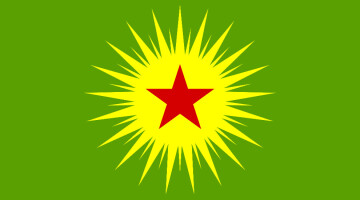Less than 20 days are left before the Iraqi parliamentary elections take place. The election campaign in Başur is continuing at a rapid pace.
The people chanting the slogan “no vote”, organised a protest and asked that these elections should not happen while the Turkish occupation of Bradost and Bashur (southern) Kurdistan continues.
The parties taking part in the elections of 12 May have started their election campaign on 15 April, and they are actually canvassing at a very quick pace. Furthermore, the elections in the Bradost area of Bashur Kurdistan are affected by the ongoing attacks carried out by the Turkish state. Likewise Kirkuk and other controversial regions are under the attacks of the DAESH gangs which are moving in parallel with the Turkish state.
Inevitably these attacks are also interfering with the Iraqi elections. Therefore, the parties in Iraq, and the Kurdish parties in Kurdistan, will link the elections to the response to these attacks and attitudes towards the occupation.
In the past days Iraq sent border security forces to the area where occupation attacks are taking place in the Bradost area. Border security forces were called back after they rejected the attempt to invade by the Turkish forces, but made no comment.
This initiative carried out by the Iraqi forces was to give the people of Southern Kurdistan a clear message: 'we are against the occupation'. Iraq has seen the attitude and reaction of the people of Bashur Kurdistan against Turkey invasion attempt while occupying Afrin. Which is why Iraq sent its forces to the border to investigate the stage of occupation attacks but also to show the people of Kurdistan that it is against this occupation and will do what’s necessary to protect its borders, as the constitution states.
The Iraqi central government is taking into account the reaction of the people of South Kurdistan towards the occupation and wants to see what the Kurdish parties think of the occupation. So far, apart from Goran and the Tevgera Azadi party, there has been not a clear-cut attitude towards the occupation.
There are calls to invite the people of Bashur Kurdistan not to vote for parties that do not oppose occupation. This will affect the results, as the people of Bashur Kurdistan have set the criterion of voting for parties condemning the occupation. More votes can be cast on parties who are openly opposed to the occupation.
The other hot issue among Kurdish politicians, political experts and intellectuals is to see how the elections will be affected in Kirkuk and controversial regions under DAESH attacks. It would be interesting to see which parties the people will vote for.
It would seem that the party to lose most votes in Kirkuk would be the KDP. The KDP is seen as having associated its policies to Turkey.
At the same time it looks like that the Kurdish parties’ 8 parliamentary seats in Mosul could also be lost. The predictions are that Komale Islam would maintain its votes. Goran that opposes occupation and has a clear stance, is said to be able to maintain its votes, and the same applies to Tevgera Azadi. The PUK is said to maintain its votes in Sulaymaniyah and Soran.
Whether they like it or not, party leaders must take into consideration the stance of people who clearly said they would vote for parties opposing Turkish opposition attempts. So far, though only a few parties have taken a clear stance on this. Which induces to think that many parties would see their vote decreasing.
When the official electoral campaign is launched, everywhere in the world, the parties prepare by organizing rallies, meetings and special publications. In Bashur Kurdistan posters and flags are being printed to be delivered and put up in towns, villages and cities, while parties are opening election offices in the different constituencies.
Meetings and rallies are expected to be organised in various places. Parties are expected to explain to voters their electoral programs although in Bashur Kurdistan few parties so far have done so.
The majority of the parties are actually engaged in smear campaigns against each other in social media, newspapers, magazines and television channels rather than worry with the preparation of rallies, demonstrations and meetings.
People have shown their contrariety to this way of conducting political campaigns and have confirmed that they will not vote for those parties wasting time insulting Kurdish personalities but rather for those Kurdish politicians who declare their opposition to the occupation and their commitment to the defence of Kurdish heritage and culture.

